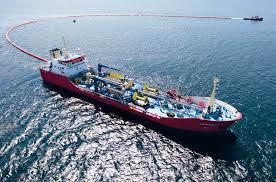GENERAL INFORMATION
The European Maritime Safety Agency (EMSA) was established under Regulation (EC) No 1406/2002 of the European Parliament and of the Council1 for the purpose of ensuring a high, uniform and effective level of maritime safety, as amended. The Agency’s main objective is to provide technical, operational and scientific assistance to the European Commission and Member States in the proper development and implementation of EU legislation on maritime safety, pollution by ships and security on board ships.
To accomplish this, EMSA’s most important supporting tasks is to foster cooperation with, and between, Member States in all key areas and to build-up capacity of national competent authorities. EMSA also supports in accordance with its founding regulation member States’ pollution response actions in case of pollution caused by ships as well as marine pollution caused by oil and gas installations.
Article 2b of the EMSA founding Regulation reads: the Council and European Parliament agreed that the European Maritime Safety Agency (EMSA) in cooperation with the European Border and Coast Guard Agency (FRONTEX) and the European Fisheries Control Agency (EFCA), shall support national authorities carrying out coastguard functions at a national and Union level, by providing surveillance and communication services based on state-of-the-art technology, including space-based, aerial and ground infrastructures.
The Explanatory Memorandum of the European Commission (COM(2015)667, Proposal for amending the Regulation of EMSA, p.6) stipulates: The Agency will organise and provide, as an institutional service provider, RPAS [Remotely Piloted Aircraft Systems] services operations in support of European Border and Coast Guard Agency and border control authorities. This technology has a multipurpose character and can be used for a variety of public tasks at sea (border control, safety of navigation, Search and Rescue, pollution detection, fishery control, law enforcement actions).
Strengthening the cooperation between the Agencies will further enhance synergies and multipurpose use of the same assets. These RPAS operations consist of EMSA providing a full-scale service including aircraft provision, piloting services, communication means and data dissemination and integration with the maritime data available in the other EMSA systems. The provision of RPAS services for maritime surveillance further increases the real time maritime situational awareness of Member States by enhancing the maritime picture with additional sources of data. EMSA received also the mandate to “work with the Member States to support with additional means, in a cost efficient way, the pollution response actions in case of pollution caused by ships as well as marine pollution caused by oil and gas installations, when a request for assistance has been presented” (Art. 2 (3) d of Regulation (EC) No 1406/2002 as amended).
In the context of this mandate, EMSA has a network of oil pollution response vessels (OPRV) that are on stand-by along the EU coast, pre-fitted and equipped with specialised oil pollution response (OPR) equipment. In 2018 EMSA contracted an RPAS service under FWC EMSA/2018/OP/12/2018 “Lightweight RPAS supporting operations from vessels” that will end in 2022. With the afore mentioned RPAS service, the EMSA oil pollution response service has been improved, as the RPAS onboard can provide an aerial overview around the vessel and the surrounding oil pollution on the sea surface. The RPAS is able to gather additional information, such as visual imagery which enables oil spill identification and assists the oil spill coordinators in guiding the vessels during the clean-up operations and in monitoring the efficiency of dispersant spraying.
The provision of lightweight RPAS services as targeted with this procurement aims to continue complementing the oil pollution response actions from EMSA. Additionally, the contracted lightweight RPAS services have been used in support of EU Agencies and Member States in the scope of general maritime surveillance and pollution response exercises, and in support to pollution detection and other functions within port areas in support of the activities of port authorities. The provision of the contracted services under this procurement aims also to continue with the above-mentioned support and shall be capable of providing general maritime surveillance functions and activities in port upon request of Member States and/or European institutions and bodies. This RPAS service will enhance maritime surveillance capabilities in support of EU and European Free Trade Association (EFTA) Member States and European institutions and bodies operations in the fields of pollution response at sea, safety or maritime surveillance. Throughout this document and related appendixes, the term “tenderer” refers to those organisations submitting a tender, proposal, or bid in response to this invitation to tender. Tenderers shall address the requirements in their proposal as requested in the procurement documents. The term “contractor” refers to the successful tenderer with whom a final Framework Contract (FWC) has been signed and who shall perform the requested services and shall fulfil the requirements during the execution of the contract. The terms “bid” or “tender” or “proposal” will be considered equivalent. Also, the term “contracting authority” refers to EMSA who is responsible for the FWC for these services.
OBJECTIVES
The objective of this call for tender is to contract Lightweight Remotely Piloted Aircraft Systems (RPAS) services in the civil maritime domain in support of EU and EFTA Member States and European institutions and bodies operations in the fields of pollution response at sea, safety or maritime surveillance and further improve an integrated and real time maritime operational awareness picture. Lightweight RPAS services will support operations from vessels, land spots in the coastline or ports and will enhance the aerial view of the area of interest around.

